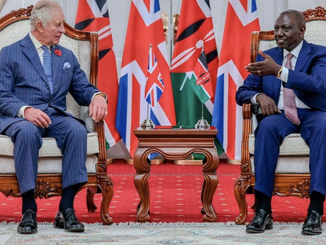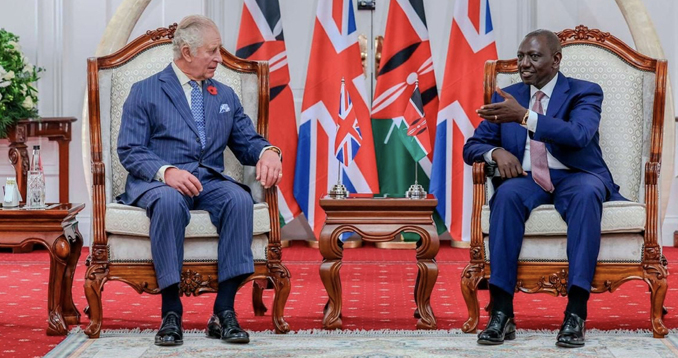

King Charles with Kenyan president William Ruto a the state house in Nairobi
by Imitaz Popat
King Charles acknowledged the “abhorrent and unjustifiable acts of violence committed against Kenyans” during their independence struggle during his state visit to Kenya on October 31, 2023. He expressed his “greatest sorrow and regret” and that there was “no excuse”. But he did not deliver a formal apology – which would have to be decided by government ministers.
In response, Kenya’s President William Ruto praised the King’s courage for addressing such “uncomfortable truths”. The Kenyan head of state told the King that colonial rule had been “brutal and atrocious to African people” and that “much remains to be done in order to achieve full reparations”. Ahead of the King’s state visit to Kenya, the first to a Commonwealth country since the start of his reign, there had been speculation about a symbolic royal apology.
Under a new King, the British Monarchy is grappling with ways to ease its relations with former colonies demanding recognition and reparation for imperial abuses. On Tuesday, Britain’s King Charles III and Queen Camilla began a state visit to Kenya, a former British colony where more and more people are demanding an apology for the UK’s past in the country.
Between 1952 and 1960, more than 10,000 people were killed during the Mau Mau revolt against colonial rule, one of the single bloodiest repressions in British imperial history. Thirty-two colonists were also killed.
The NGO Kenya Human Rights Commission (KHRC) on Sunday called on the King on behalf of the British government “to make an unconditional and unequivocal public apology… for the brutal and inhuman treatment inflicted on Kenyan citizens throughout the colonial period”, an era spanning 1895-1963.
The KHRC also demanded reparations “for all atrocities committed against different groups in the country”. After years of litigation, London agreed in 2013 to compensate more than 5,000 Kenyans who were victims of abuse during the Mau Mau insurrection.
But for chef Maureen Nkatha, “it’s time to move on”. “We are now an independent country… It’s embarrassing to keep asking the British to pay us for the wrongs done when we want to be treated as independents,” says the 33-year-old.
After being received by the Kenyan presidential couple, William and Rachel Ruto, Charles III, dressed in a blue striped suit with a red poppy, and Camilla, in a white dress, paid a symbolic visit to the “Uhuru Gardens” (“uhuru” meaning “freedom” in Swahili) in the capital Nairobi.
The king laid a wreath at the tomb of the unknown soldier in the place where the Kenyan flag was hoisted in December 1963 in place of the British Union Jack. This four-day visit, coming not long before Kenya celebrates 60 years of independence in December, is Charles III’s first as King in a Commonwealth country. The British embassy said in a statement that the trip is intended to “underline the strong and dynamic partnership between the UK and Kenya”.
After state visits to Germany and then France, marking London’s desire to forge closer ties with its European allies, Charles is turning his attention to the Commonwealth.
This vestige of the British Empire, which brings together 56 countries, most of them former British colonies, has been challenged by growing criticism of the United Kingdom’s colonial past.
Other visits by members of the Royal Family to former colonies including Canada have caused a stir. In the Caribbean last year, Prince William and Kate were called upon to apologise for the UK’s slave-owning past.

Leave a Reply